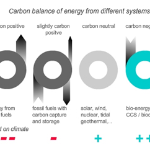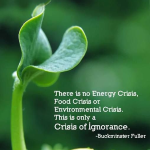
Chemosynthetic Management of the Water/Energy/Nutrient Nexus (WENN) by The WENN Protocol
 Michael Hayes Jul 17, 2015 06:11 | Proposal contributor
Google Doc reflecting final submission form:
https://docs.google.com/document/d/16xC-3NXB9xCt91IbkanFNX57L_3md0aHv1QldPtHKl0/pub
|
 Maruf Sanni Jul 22, 2015 09:42 |
Hi Michael123,
I am Maruf, one of the fellows for this contest.
Thank you for submitting your idea on this platform.
You ideas are good and ambitious!!!
However, can you please make it more relevant to the situation in the 'other developing countries' as specified on the resource page?
This will allow the judge to be able to put it within the right context.
Thank you once again.
|
 Michael Hayes Jul 29, 2015 04:22 | Proposal contributor
Hello Maruf,
The WENN Protocol and technology suite is highly relevant to....any....region. As I tried to explain in my writings, the WENN Protocol is an attempt to standardize and coordinate actions across all regions so as to create an equal opportunity for all nations to participate in an advance mitigation and adaptation effort.
The technologies being proposed can be used in all sectors (i.e. urban, rural, distant rural and marine environments). Thus, the technology is 'Universal' in its nature and use.
The overall protocol is an attempt to bring coordinated funding opportunities to...all..nations, cities and even the smallest communities.
The Green Bond market can reach trillions of dollars yet there is a need to bring high levels of coordination to the wide spectrum of issues to insure the best use of the funds and to also insure that the climate change mitigation/adaptation technologies being paid for through the Green Bonds are used to their greatest abilities.
Currently, we have many technologies available to help us mitigate and adapt to climate change. What we do not have is a widely coordinated means of funding and managing those critical technologies. The WENN suite of technologies can provide a 'Universal' base upon which coordinated funding and management can be achieved. Without a strong and coordinated 'Universally' coordinated funding and management regimen ...nothing....on the scale needed to aggressively mitigate or adapt to climate change....can...emerge.
The problem is too vast for uncoordinated/piecemeal efforts to solve in the time available. The WENN Protocol is an effort to coordinate actions, funding and possibly even mitigation/adaptation governance between all nations, regions and even the smallest villages.
The multiple problem sets we currently face (and will face for generations) is so complex and vast that nothing short of a full trans-regional/global scale coordinated effort will prevent the climate disruption which is already baked into the system.
Maruf, thank you for your comment and suggestions. I value any opportunity to clarify my work as it is rather complex and...yes...ambitious. Climate change mitigation and adaptation will need both ambitious and even bold ideas and actions. It will also need many important actors willing to step outside their own comfort zone as what we, as a species, are currently and comfortably doing today is simply not working in our collective interests.
Warmest wishes,
Michael
|
 Maruf Sanni Aug 8, 2015 10:13 |
Thank you for submitting your proposal to this Climate CoLab contest.
Because you had submitted it before July 18th, the contest Judges and fellows were able to review your proposal and provide you with some feedback, which we have included below. We hope that you will use it to further develop your work before the August 31 deadline.
On that date at midnight Eastern Time, your proposal will be locked and considered in final form.
The Judges will then select which proposals will continue to the Finalists round. Finalists are eligible for the contest’s Judges Choice award, as well as for public voting to select the contest’s Popular Choice award. The Winners will receive a special invitation to attend selected sessions at MIT’s SOLVE conference and showcase their work before key constituents in a workshop the next day. A few select Climate CoLab winners will join distinguished SOLVE attendees in a highly collaborative problem-solving session.
In addition, if your plan is included in one or more winning global plans, you will receive Climate CoLab Points, and the top point-getters will receive shares of a cash prize of $10,000.
Thank you for your great work and good luck!
2015 Climate CoLab Judges & Fellows
Judges' Feedbacks
Judge: Silvia Pariente-David
The proposal is interesting and innovative but needs some work. The concept is not well articulated, and it is not clear what is funded by whom. The benefits are not fully specified, with only a vague and generic description. There is no cost assessment. The author should be more specific regarding the implementation plan: who develops the technology? Who pays? Who funds what? what is the impact on GHG reduction? what are the other benefits? While there are many graphical illustrations, their links to the rest of the argument, and how they support the WENN concept is not crystal clear. Finally the proposal should explain better how the different proposals fit together.
Judge: Pedzi Makumbe
Novelty: the proposal is fairly novel, and well done to the team
Feasibility: feasibility is highly questionable. Perhaps doing/proposing a pilot might be helpful. Its such a massive system that there is need to discuss how the politics/societal inertia could be brought along.
Impact: If implemented, this would have tremendous impact on the society.
Presentation - the team needs one or two sentences which explain what this is. Its really not clear at the first cut what is being proposed, and what is new. The “summary” in the report can be a follow on to the couple of sentences which say what this is.
Fellows' feedbacks
Fellow: Maruf Sanni
The proposal is novel and has potentials for both mitigation and adaptation strategies. It is feasible and can be scaled up but needs a lot of clarifications.. The proposal is well presented with lots of graphical illustrations. However, the proposal should be made to be more specific to the situations in the developing countries. This way, it will benefit from good review from the judges of this contest. For instance, the funding structure should be well spelt out. The author should also be specific with regard to the implementation structure. For example, who will develop the technology? Who pays for it? What are roles of the public sector? The significance of the impact of the project will also be clearer if the author could work with the impact assessment team of the Climate CoLab to calculate the amount of carbon that would be captured or sequestered.
Fellow: Leslie Labruto
The proposal is innovative, but needs some work. While the graphics are helpful, there needs to be a better synthesis of ideas and explanations to how the images link to the WENN system. It looks some time to draw the connection each image as they followed one another.
That said, using unused space, which can be scarce, to create high volume of WENN substances is unique. My questions for the author are: (1) how do you procure the land expected to use for this undertaking and (2) why are all of the funding sources grants? If this is a strong idea which a post-growth aftermarket sale, shouldn’t the investors in a project like this that has potentially lucrative returns be looking at private sector funding rather than the GCF or Bill and Melinda Gates? Thinking through the longer term economics of your proposal.
|
 Michael Hayes Aug 12, 2015 02:40 | Proposal contributor
Dear Judges,
I greatly appreciate the amount of high level thought that the Judges obviously gave their evaluations and I will work diligently to address each concern. In brief, I am truly impressed with your collective acumen.
I found the below quote in the bio of Heather McGowan which may best sum up my primary challenge in completing the WENN Protocol:
“Leadership requires two things: a vision of the world that does not yet exist and the ability to communicate it.” Simon Sinek
Warmest regards,
Michael
|
 Michael Hayes Aug 12, 2015 09:11 | Proposal contributor
The limited space provided within the CoLab form makes addressing the suggestions and concerns of the Judges extremely difficult within that limited space. Also, the time and effort spent in simply trying to work in such a limited space needs to be better spent.
Thus, I've transferred the CoLab format to a Google Doc (link below). This allows for expanded text, better graphics, more complete explanations at multiple levels (i.e. non-technical, policy centric, funding centric and STEM centric etc.).
This link will also allow the reader to follow the conceptual development of the U.S. Plan: Chemosynthetic Management of the Water/Energy/Nutrient Nexus (WENN)
even after the CoLab competition is complete.
The link is below and you may need to copy and paste it into your browser as links to such 'work-arounds' many times become broken.
https://docs.google.com/document/d/16xC-3NXB9xCt91IbkanFNX57L_3md0aHv1QldPtHKl0/pub
Best regards,
Michael
|
 Michael Hayes Sep 1, 2015 09:02 | Proposal contributor Impact Assessment Fellow Yi Huang Questions the WENN: https://docs.google.com/document/d/1UiisSwajmSxVXwyMMYMefDdFkNGlny_cJVzCQPf6-Kw/pub The above 5 page Q&A exchange may clarify some aspects of the WENN Protocol. Thank you for the questions, Yi. Michael |
 Michael Hayes Sep 2, 2015 04:56 | Proposal contributor Robert Simmon & Jesse Allen - NASA Earth Observatory Red circles on this map show the location and size of many of our planet’s dead zones. Black dots show where dead zones have been observed, but their size is unknown. It’s no coincidence that dead zones occur down river of places where human population density is high (darkest brown). Darker blues in this image show higher concentrations of particulate organic matter, an indication of the overly fertile waters that can culminate in dead zones. |
 Michael Hayes Sep 2, 2015 07:14 | Proposal contributor The above map shows marine hypoxic/anoxic areas where WENN production would be highly efficient. |
 Michael Hayes Sep 12, 2015 03:37 | Proposal contributor Greetings, There has been further refinement of the Water, Energy, Nutrient Nexus (WENN) Protocol in the area of authorship and organization. The link to that work is: https://docs.google.com/document/d/16xC-3NXB9xCt91IbkanFNX57L_3md0aHv1QldPtHKl0/pub However, there still is the need to address each nation's/region's ability to use the WENN Protocol per the competition(s) mandate.I'm working my way through the information found in the World Resource Institute database: http://cait.wri.org/ and hope to be able to make clear linkage between the national pledges and the WENN Protocol within the revision time frame allowed within the Finals stage of the competition. Your continued patients with the development of the WENN Protocol proposal and further support would be greatly appreciated. Best regards, Michael |
 Michael Hayes Dec 2, 2015 05:24 | Proposal contributor The following is a copy of a comment added to the 'Global Plan' which evolved from this proposal. Response to Judge’s Remarks (Judges Comments 1) “iWENN Management Protocol has several commendable features -– especially its scale of vision. However, we have hesitations about this proposal. The Protocol as outlined here is not realistic under current socio political conditions. Neither public nor private sector actors are ready to pursue this model. Green minded fund managers (almost an oxymoron) are extremely unlikely to invest in the high cost, high-risk ventures described in the sub-proposal.” (Response 1) As the Pope succinctly noted in a recent statement seen here in Rueters: "I am not sure, but I can say to you 'now or never.' Every year the problems are getting worse. We are at the limits. If I may use a strong word I would say that we are at the limits of suicide.". The Pope is not the only leader to realize the urgency which we now face and there is a growing number of leaders in the financial community which have also awaken to the need for strong new measures which inherently will be somewhat risky during initial development. Business as usual is simply suicidal and going beyond business as usual will require some degree of risk. One excellent example of financial leaders realizing this existential need for moving beyond business as usual is found within CERES’s Clean Trillion Initiative. (Response 2) As to the comment concerning “high cost, high-risk ventures described in the sub-proposal” and or the previous comment of "BECCS is not proven at large scales”: It is well understood at the IPCC (WG3) level that the only limiting factor in establishing vast scale BECCS operations is the availability of sustainable low cost upstream biomass. The technical aspects of marine biomass production are also well understood and the use of the Oxyhydrogen Reaction in Algae is well understood as well and is, in fact, currently used at the industrial level. Please read this relevant patent: In brief, the judges who discredited the use of the above biotechnology, used in the previous national/regional proposals, simply did not understand the science!!!! I ask this panel of judges to not make that same mistake. Stating confidently that the Oxyhydrogen Reaction in Algae is not 'feasible' is much like that professor who 'proved beyond all reasonable doubt' that heaver than air flight is impossible...3 months after the first flight at Kitty Hawk!!!! Finally, the position that high level investors are not inclined to aggressively fund new technology is problematic as current developments seem to show the opposite view. Please see: Breakthrough Energy Coalition “The existing system of basic research, clean energy investment, regulatory frameworks, and subsidies fails to sufficiently mobilize investment in truly transformative energy solutions for the future. We can’t wait for the system to change through normal cycles.” As such, the Global Plan, A Carbon Negative Infrastructure and Economy: A Systems Design/Mngmt Approach should be viewed as being within a reasonable, although advanced, spectrum of near term options as the science is well understood (by those that bother to read the science) and the technology is fundable as the science is currently...in use at the industrial level. To conclude, this proposal attempts to stretch the envelope as far as STEM and socially responsible global scale business development using components which are, in fact, in use today and can be rapidly scaled up to global significance. This proposal, however, is also a volunteer effort which is not meant to be a fully developed business plan and should be judged in that regards. With proper resources, a fully detailed business plan/proposal can be developed for those executives who actually understand the need for large scale and globally coordinated advanced mitigation/adaptation near term actions using state-of-the-art STEM and a socially responsible business model (as this proposal offers). Respectfully, Michael |
 Michael Hayes Dec 2, 2015 06:44 | Proposal contributor Please watch this brief message from B. Gates as it helps address the judge's concern over initial risk. |
